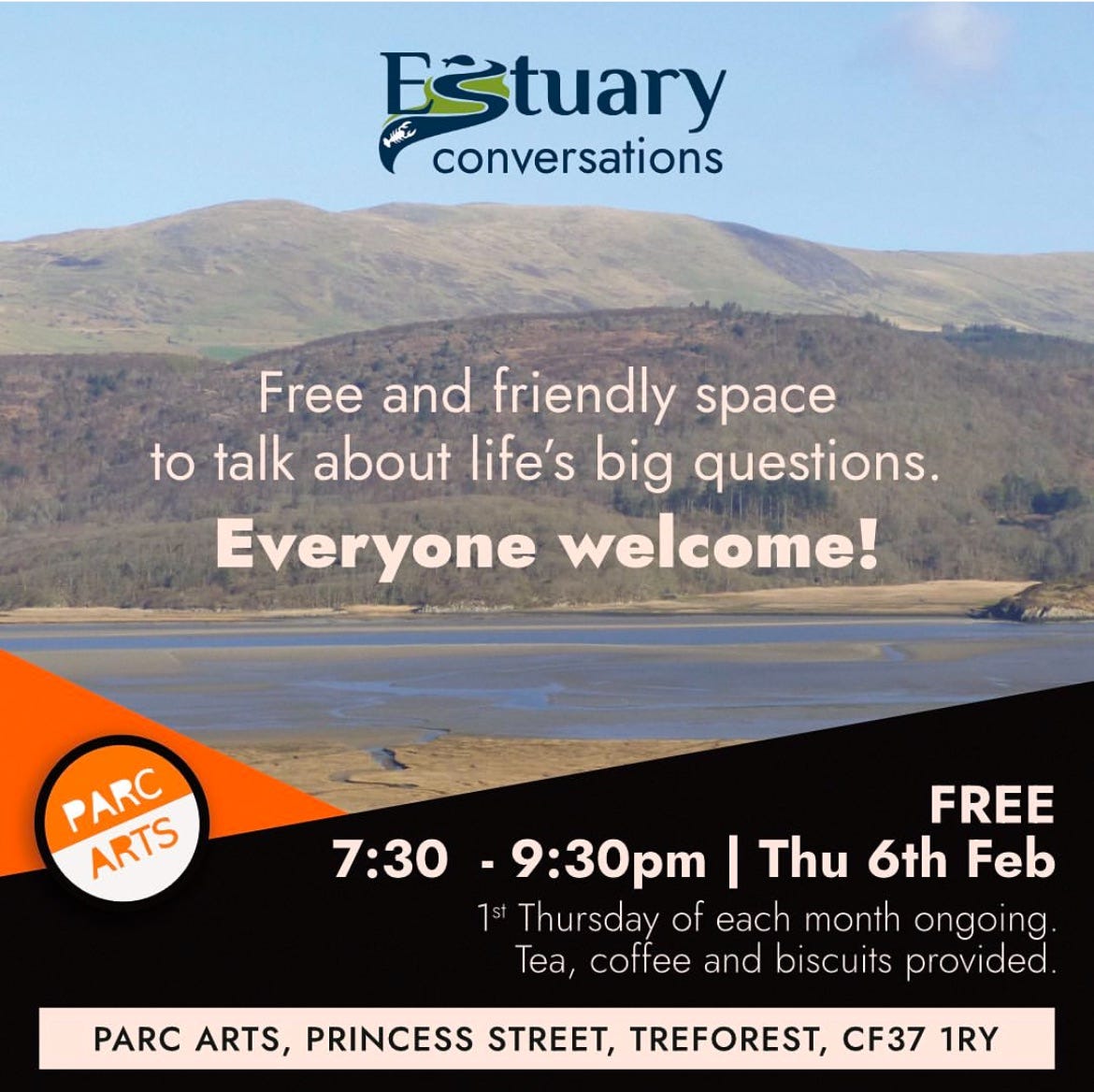Estuary and the art of creating space for meaningful conversation
How the Estuary protocol offers a tool for facilitating conversations and community around questions that matter, both offline and online
I’ve long valued having good, deep conversations with people. Back when I was a student, I was part of the university Debating Society, but got frustrated with the performative nature of competitive debate. So I started a sub-group for “non-competitive debate” for people to talk about what they really thought and seek truth together.
I’ve also really valued the lunchtime discussions at the English L’Abri community – a place of ‘shelter for honest questions’ – when I’ve visited, where people are invited to bring a question to discuss and engage thoughtfully with the chosen topic.
So I’ve been glad this week to start a new initiative in my local community, hosting the first Estuary Conversation at Parc Arts here in Treforest. These will be happening on the 1st Thursday of every month, 7.30-9.30pm.
The first meeting was a bit of a soft launch and even softer than I hoped when several people who’d expressed an interest dropped out at the last minute! But there were enough of us to have a conversation and it was great to be able to talk about some important and tricky things together.
What is an “Estuary conversation”, then, and why is it called that? Estuaries are where fresh water meets salt water, and ‘Estuary Conversations’ are a structured approach to help different people and ideas to meet and engage together. The ethos is to listen to, learn from, love and respect one another.
People are invited to propose questions or topics to the group, whether intellectual, contextual (stuff happening in the world or locally), personal or about the Estuary experience itself. The group then “upvotes” what they’d like to talk about, and then has an open discussion together.
The format was devised by John Vandonk and Paul VanderKlay, and there’s an online network for finding out more about Estuary and local groups near you at www.estuaryhub.com.
Paul VanderKlay is a pastor who spends a lot of time engaging in discussions online, including running online versions of Estuary. I took part in one of these live-streamed discussions which you can watch below:
Some of the terminology is a little bit ‘inside baseball’ for those following certain discussions online within the community of ‘This Little Corner of the Internet’ (TLC for short) but hopefully it gives an idea of the format and flow of the meeting. I was also able to bring in some of my reflections on King Arthur and Christendom which I lectured on last summer:
The Estuary group I’m running is not specifically those who are connected to that particular online community, by the way - it’s very much for anyone and everyone in my local context. Though any ‘TLC’ folks in the UK would be very welcome of course!
Estuary is also deliberately not a specifically Christian space, though the creators of the Estuary Protocol are Christians, like myself. The goal is for all viewpoints to be given an equal footing. I would hope and pray that good discussions of spiritual things would occur from time to time, and that my faith will inform my perspective on the things we discuss. But it is not intended as an evangelistic or apologetics enterprise, and I’d want to be as open about my doubts and questions about faith (which I have plenty of!) as I am about the things I hold strong convictions about.
I think in today’s culture where many people feel lonely and isolated, and where people often exist in filter bubbles of similar viewpoints (or only see the worst of other perspectives via online arguments), it’s incredibly valuable to have a space for honest conversations across different perspectives.
If you are within reach of Treforest, I’d love to have you along to the next meeting, 7.30pm on Thursday 6th March! Drop me a line on hello@calebwoodbridge.com for more details.
Or why not consider setting up something similar of your own in your own community? A key part of ‘loving our neighbours’ is listening well to one another, and Estuary is one tool for helping us do just that.
What is your experience of creating space for good conversations? Are you, or have you been, part of an Estuary group or something similar? What are the challenges and opportunities you see? Let me know your thoughts in the comments!





